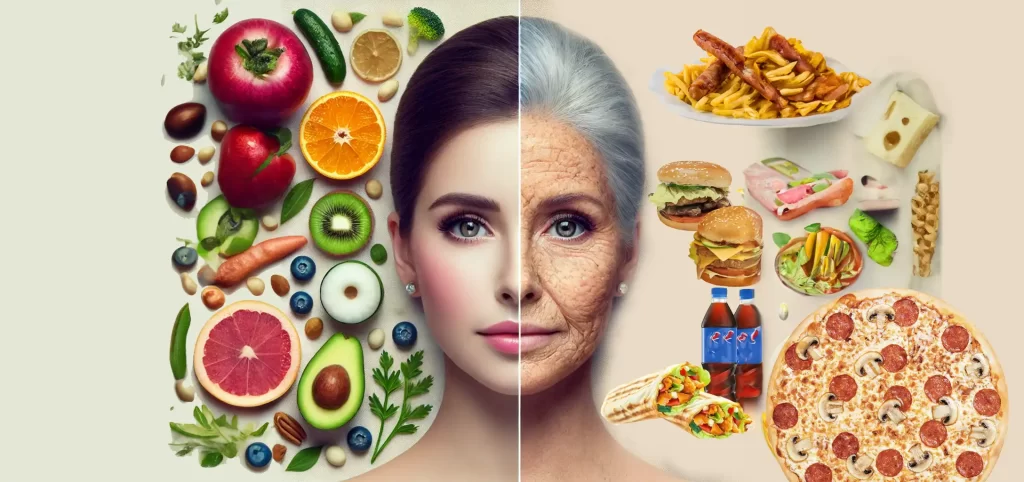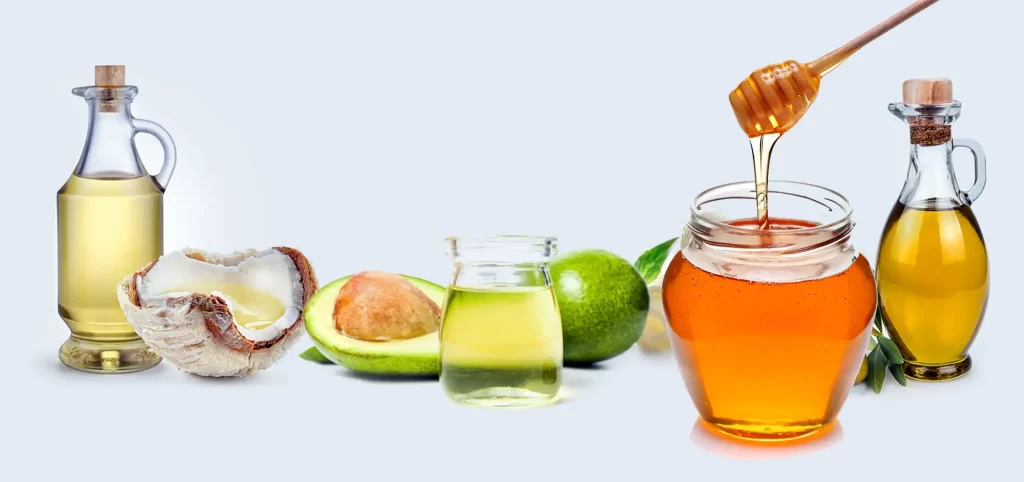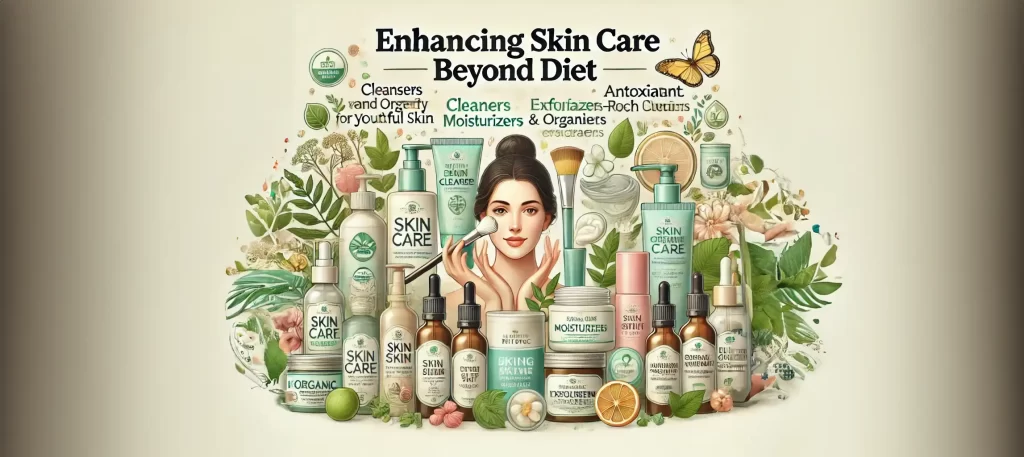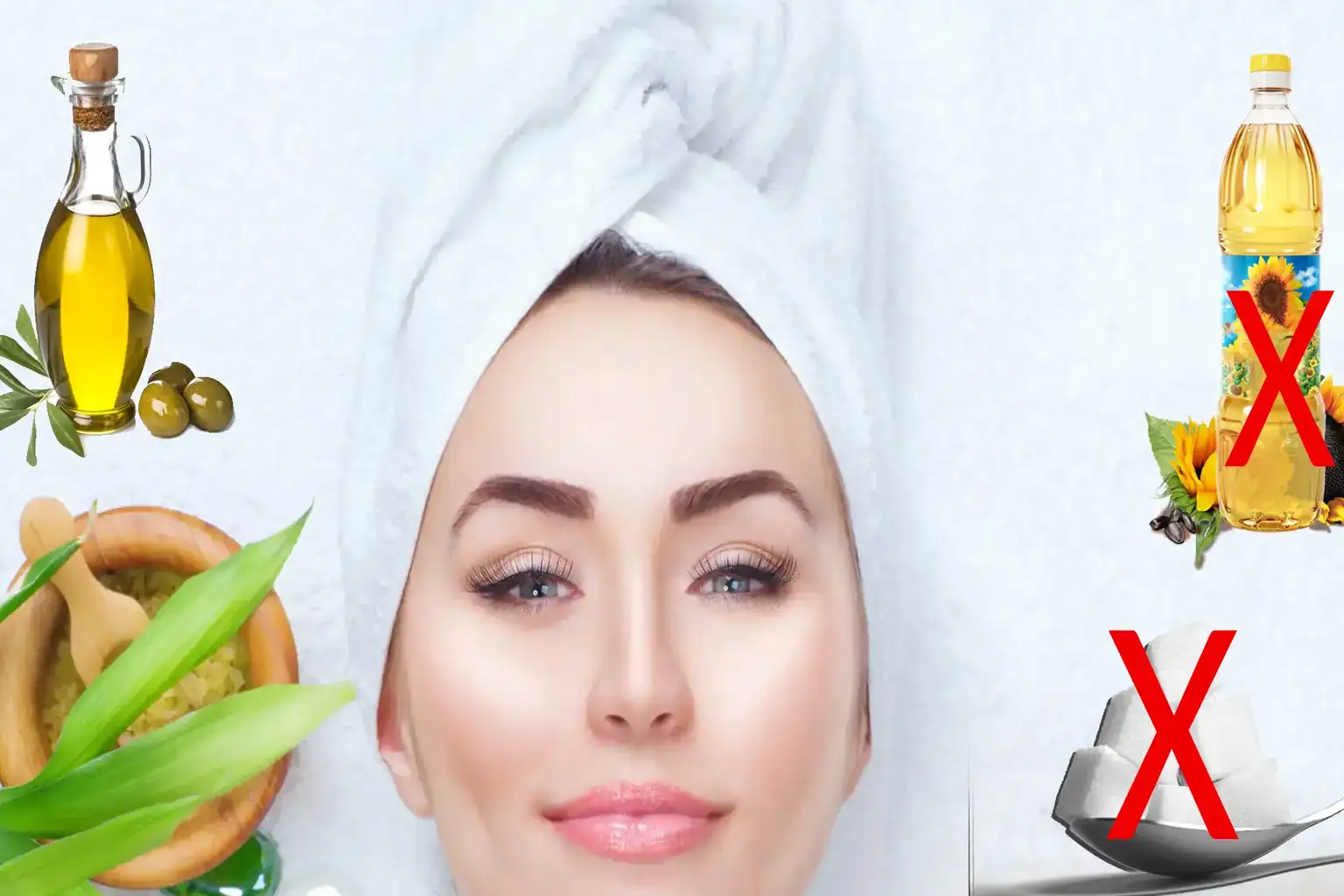The quest for youthful, vibrant skin is often steered by an array of creams, serums, and treatments. However, the foundation of truly radiant skin lies in our dietary choices. What we eat has a profound impact on our skin’s health and its aging process. Two of the most significant dietary culprits that accelerate skin aging are sugar and industrial oils. These ingredients are not only pervasive in our food supply but are also some of the most damaging to our skin’s structural integrity and appearance.
Sugar, a staple in many diets, can lead to glycation, a process where sugar molecules attach to and damage proteins like collagen and elastin, which are crucial for keeping our skin firm and elastic. Over time, this results in wrinkles and sagging skin. On the other hand, industrial table oils, which include processed seed and vegetable oils like soybean, canola, and corn oil, are rich in omega-6 fatty acids. While omega-6s are essential, an imbalance high in omega-6s compared to omega-3s leads to inflammation, which can further degrade collagen and accelerate the aging process.
By reducing the intake of these harmful components and embracing a balanced, nutrient-rich diet, you can significantly enhance your skin’s health and longevity. This shift not only helps in retaining the skin’s youthful glow but also strengthens its ability to ward off signs of aging. This blog post aims to guide you through understanding the direct link between your diet and skin health and provides actionable tips to transform your dietary habits for lasting skin youthfulness.
Let’s explore how you can make these changes and delve deeper into what makes an anti-aging diet effective, so you can not only feel but also see the benefits through a healthier, more youthful complexion.

Understanding Skin Aging
Aging is an inevitable natural process that affects every organ in the body, including the skin, which is the largest and one of the most visible. The appearance and health of our skin as we age are not solely dictated by our genetics; our diet plays a significant and direct role. How and what we eat can either accelerate or mitigate the natural aging process, particularly through its impact on skin health.
The Natural Aging Process of Skin
As we age, our skin undergoes several changes:
- Decreased Collagen Production: Collagen is the protein responsible for the skin’s firmness and elasticity. Aging reduces collagen production, leading to wrinkles and saggy skin.
- Reduced Skin Elasticity: Elastin fibers in the skin start to break down, causing the skin to lose its bounce-back quality.
- Moisture Loss: The skin’s ability to retain moisture diminishes, often resulting in dryness and a rougher texture.
- Thinner Skin Layers: The skin becomes thinner and more fragile due to a decrease in the production of essential cells and nutrients.
How Diet Influences Skin Aging
The link between diet and skin aging is powerful. Nutrients, or lack thereof, directly affect the health and appearance of the skin:
- Antioxidants: Foods rich in antioxidants, such as vitamins C and E, can protect the skin from oxidative stress caused by free radicals, which accelerates aging. Antioxidants help in the repair of damaged skin cells and stimulate collagen production.
- Healthy Fats: Omega-3 fatty acids found in fish, nuts, and seeds help maintain the skin’s lipid barrier, essential in retaining moisture and protecting against environmental damage.
- Sugar and Advanced Glycation End-products (AGEs): High sugar intake promotes the formation of AGEs, which stiffen collagen and elastin fibers, leading to premature wrinkles and skin sagging.
- Water and Hydration: Adequate hydration is crucial. Water helps maintain optimum skin moisture and delivers essential nutrients to the skin cells. It also helps detoxify the skin and improve its elasticity.
Nutrition and Skin Elasticity, Moisture, and Overall Appearance
Eating a diet high in fruits, vegetables, lean proteins, and healthy fats can significantly improve the skin’s elasticity, moisture content, and overall appearance. Foods like berries, citrus fruits, leafy greens, and fatty fish not only provide essential nutrients but also contain bioactive compounds that provide a defense against harmful agents and support skin cell renewal.
To maintain youthful skin, it is beneficial to reduce the intake of processed foods, sugars, and industrial oils that can exacerbate the natural aging process. Instead, focus on a balanced diet that supports skin health and combats aging effectively.
The Role of Industrial Table Oils in Skin Aging
Industrial table oils, commonly found in many kitchens and processed foods, play a more significant role in skin health and aging than many might expect. Understanding what these oils are and how they affect your skin can be crucial in maintaining a youthful appearance and overall health.
What Are Industrial Table Oils?
Industrial table oils, often referred to as vegetable oils, are extracted from seeds like soybean, corn, rapeseed (canola), and cottonseed. These oils undergo extensive processing involving high heat, deodorization, and the use of chemical solvents. Common types include:
- Soybean Oil: Widely used in processed foods and for cooking.
- Canola Oil: Known for its low saturated fat content but high in omega-6 fatty acids.
- Corn Oil: Common in frying oils and processed snacks.
- Cottonseed Oil: Often used in margarine and salad dressings.
These oils are prized in the industrial and commercial food sectors for their extended shelf life and low cost, but their health impacts are a growing concern.
Impact on Skin Health and Aging
Industrial table oils can significantly impact skin health due to their high omega-6 fatty acid content. While omega-6s are essential fatty acids necessary for health, the modern diet is overwhelmingly rich in these fats compared to omega-3 fatty acids, leading to an imbalance that can promote inflammation in the body, including the skin.
Inflammatory Response: Chronic inflammation accelerates the breakdown of collagen and elastin, the fibers that give skin its firmness and elasticity. Over time, this can lead to premature aging, characterized by wrinkles, sagging, and a dull complexion.
Oxidative Stress: The processing of these oils can create free radicals—unstable molecules that damage cells. When consumed, these free radicals can lead to oxidative stress, which further damages skin cells and accelerates aging.
Barrier Disruption: Healthy skin relies on a balance of lipids to maintain its barrier. Industrial oils can disrupt this natural lipid barrier, making the skin more susceptible to environmental pollutants and UV radiation, which can accelerate aging and damage.
By reducing the consumption of foods containing industrial table oils and switching to healthier alternatives like olive oil, avocado oil, or coconut oil, you can support your skin’s health and reduce the signs of aging.
Sugar’s Impact on the Skin
Sugar, while a staple in many diets worldwide, has a profound and often underestimated impact on skin health, particularly concerning aging. Understanding the different types of sugar and their specific effects on the body can help mitigate their negative impacts, especially on the skin.
Types of Sugar and Their Effects
Sugar comes in various forms, broadly categorized into natural sugars and added sugars:
- Natural Sugars: Found in fruits (fructose) and dairy products (lactose), these sugars are generally consumed with fiber, vitamins, and minerals that can mitigate some of their negative effects.
- Added Sugars: These include sugars added during processing or preparation, such as sucrose (table sugar) or high-fructose corn syrup. Added sugars are prevalent in sodas, snacks, and fast foods and are primary culprits in numerous health issues, including skin aging.
Glycation and Skin Aging
One of the most detrimental effects of sugar on the skin is through a process known as glycation. Glycation occurs when excess sugar molecules attach themselves to collagen and elastin fibers, two proteins that are crucial for keeping the skin firm and elastic. This attachment leads to the formation of harmful new molecules known as advanced glycation end-products (AGEs).
The Role of AGEs:
- Loss of Elasticity: AGEs cause the collagen and elastin in the skin to become stiff and malformed, leading to the loss of elasticity. This results in sagging and wrinkling of the skin, contributing significantly to an aged appearance.
- Increased Skin Vulnerability: AGEs exacerbate the skin’s vulnerability to environmental stressors like UV light and pollution. They impair the antioxidant defense system of the skin, making it more prone to oxidative stress, which accelerates aging further.
- Inflammation: Glycation and the formation of AGEs promote inflammation, which can manifest as skin conditions such as acne or rosacea, further impacting the skin’s appearance and health.
Reducing sugar intake, particularly added sugars, can significantly slow the glycation process and its aging effects. Emphasizing a diet rich in antioxidants can help combat the oxidative stress caused by AGEs, supporting skin’s health and delaying the signs of aging.
Identifying Hidden Sugars and Oils in Your Diet
In our journey towards healthier skin and overall wellness, understanding how to read food labels is crucial. Hidden sugars and industrial oils are often disguised under various names, making them tricky to spot. These ingredients can significantly impact skin health by accelerating aging and promoting inflammation.
Tips for Spotting Hidden Sugars and Oils
1. Know the Aliases:
- Sugars: Look beyond the obvious ‘sugar’ label. Hidden sugars can appear as high-fructose corn syrup, dextrose, maltose, rice syrup, and more.
- Oils: Industrial oils may be listed as ‘vegetable oil,’ ‘hydrogenated oils,’ or specific names like ‘soybean oil,’ ‘canola oil,’ and ‘palm oil.’
2. Check the Order of Ingredients:
- Ingredients are listed by quantity, from highest to lowest. An early appearance of sugars or oils indicates a higher concentration in the product.
3. Beware of ‘Fat-Free’ Claims:
- Fat-free products often contain more sugar to compensate for reduced flavor and texture. Similarly, low-sugar products might have higher fat content.
4. Watch for Multiple Types of Sugar:
- Manufacturers often use multiple sugar sources, which, when combined, could contribute a significant amount to the product.
5. Understand Serving Sizes:
- Nutrition labels base their metrics on serving sizes, which can be misleadingly small. Evaluate the realistic quantity you consume and calculate accordingly.
Understanding Misleading Marketing Practices
Manufacturers often use marketing tactics that can obscure the real content of their products:
- Health Claims: Terms like ‘natural,’ ‘organic,’ or ‘made with real fruit’ do not necessarily mean the product is free from high amounts of sugar and unhealthy oils.
- Branding: The use of earth tones, nature images, and ‘wholesome’ fonts might suggest a product is healthier than it actually is.
- Certifications and Labels: While some labels genuinely indicate healthier options (like ‘USDA Organic’), others might be used to distract from less desirable ingredients.
By becoming adept at reading and interpreting food labels, you can avoid unwanted sugars and oils, paving the way for better skin health and overall well-being. Making informed dietary choices is a powerful step in maintaining youthful, vibrant skin.
Natural Alternatives for Skin Health
In the quest for youthful, vibrant skin, choosing the right dietary components can make a significant difference. Instead of relying on industrial table oils and processed sugars, which can accelerate the aging process, consider integrating natural oils and sweeteners that promote skin health. Here are some beneficial alternatives that can enhance your skin’s appearance and vitality.

Healthy Fats and Natural Oils
1. Olive Oil: Rich in antioxidants and anti-inflammatory properties, olive oil is a staple in the Mediterranean diet, known for maintaining skin’s elasticity and combating oxidative stress.
2. Avocado Oil: High in vitamins A, D, and E, avocado oil helps to penetrate the skin to nourish, soften, and hydrate. It also helps in promoting collagen production, which keeps the skin plump and decreases the effects of aging.
3. Coconut Oil: Known for its moisturizing benefits, coconut oil is excellent for improving skin barrier function and reducing water loss from the skin, making it feel smoother and softer.
4. Almond Oil: This oil is particularly beneficial for sensitive skin. Rich in vitamin E, almond oil supports skin health by soothing skin irritations, improving complexion and skin tone.
5. Jojoba Oil: Its composition is similar to the skin’s natural oils, which makes it an effective natural moisturizer. Jojoba oil is also well-known for its ability to heal and treat skin conditions like acne, eczema, and psoriasis.
Natural Sweeteners
1. Stevia: A natural, no-calorie sweetener derived from the leaves of the Stevia rebaudiana plant. It does not contribute to the glycation process, which is a major cause of skin aging.
2. Honey: While still a sugar, honey has a lower GI value and contains antioxidants. Raw honey can help moisturize the skin and is also beneficial in wound healing due to its antibacterial properties.
3. Maple Syrup: Another alternative with antioxidants, maple syrup can be a better option than refined sugar if used in moderation. It contains minerals like zinc and manganese, which help to combat inflammation and improve skin health.
4. Monk Fruit Sweetener: This is a natural sweetener that contains zero calories and does not raise blood sugar levels. Its antioxidant properties can also help fight free radicals.
Switching to these natural alternatives can not only help maintain your skin’s youthful glow but also contribute to overall health. By incorporating these healthier fats and sweeteners into your diet, you’re taking an active step toward preventing premature skin aging.
Dietary Changes for Youthful Skin
Achieving youthful, glowing skin isn’t just about what you apply externally; it also comes from within. A diet rich in antioxidants, vitamins, and minerals plays a pivotal role in maintaining the health and appearance of your skin. Additionally, staying hydrated is crucial for skin elasticity and overall vitality. Here’s how you can adjust your diet to promote skin health and retain that sought-after youthful glow.
Antioxidant-Rich Foods
Antioxidants combat oxidative stress, which is responsible for much of the skin damage that contributes to aging. Including a variety of antioxidant-rich foods in your diet can significantly improve skin health.
- Berries: Strawberries, blueberries, and blackberries are loaded with antioxidants that help keep the skin radiant.
- Leafy Greens: Spinach, kale, and other green vegetables are high in vitamins A, C, and E, which protect the skin and promote healing.
- Nuts and Seeds: Almonds, walnuts, and flaxseeds are excellent sources of vitamin E, omega-3 fatty acids, and antioxidants, which are vital for maintaining skin health.
Vitamins and Minerals for Skin
A diet that includes a broad spectrum of vitamins and minerals can enhance skin quality and delay the signs of aging.
- Vitamin C: Found in citrus fruits, bell peppers, and broccoli, Vitamin C is crucial for collagen production and also serves as a potent antioxidant.
- Vitamin E: An essential antioxidant that protects the skin from oxidative damage. Avocados, nuts, and seeds are rich sources.
- Zinc: This mineral helps in repairing skin damage and keeping skin soft and supple. Good sources include beans, nuts, and whole grains.
Importance of Hydration
Hydration is key to maintaining skin elasticity and plumpness. Water helps to moisturize the skin from the inside out, aiding in detoxification and delivering essential nutrients to the skin cells.
- Drink Plenty of Water: Aim for at least 8-10 glasses a day to keep your skin hydrated and flush out toxins.
- Incorporate Water-Rich Foods: Cucumber, watermelon, and oranges can contribute to your daily water intake, providing hydration along with essential nutrients.
Implementing Dietary Changes
To integrate these changes:
- Start by gradually increasing the intake of fruits, vegetables, nuts, and seeds.
- Replace sugary beverages with water or herbal teas.
- Plan meals that include at least one source of antioxidants, vitamins, or minerals beneficial for skin health.
Adopting these dietary changes can lead to significant improvements in your skin’s appearance and texture, promoting a youthful, natural glow from the inside out.
Skin Care Regimen: Beyond Diet
While a nutrient-rich diet is fundamental for maintaining youthful skin, complementing these dietary efforts with an effective skin care regimen is equally important. Here are some essential skin care practices and product recommendations that can enhance your skin’s health and appearance without the use of harmful chemicals and oils.

Essential Skin Care Practices
1. Cleansing: Choose a gentle cleanser that does not strip your skin of its natural oils. Cleansing helps remove dirt, excess oils, and impurities that can clog pores and lead to skin issues.
2. Exfoliating: Regular exfoliation removes dead skin cells that can dull the complexion. Opt for products with natural exfoliants like jojoba beads or enzymes from fruits rather than harsh abrasives.
3. Moisturizing: Hydration is key for maintaining skin elasticity and smoothness. Use a moisturizer that matches your skin type and contains hydrating ingredients like hyaluronic acid or natural oils such as jojoba or argan oil.
4. Sun Protection: Daily use of sunscreen with at least SPF 30 can prevent premature skin aging caused by UV rays. Look for sunscreens with zinc oxide or titanium dioxide as they are less likely to irritate the skin.
Recommended Skin Care Products
When selecting skin care products, it’s crucial to avoid those containing harmful chemicals and synthetic oils which can exacerbate skin aging. Here are some recommendations:
1. Natural and Organic Products: Choose products certified organic or 100% natural to avoid exposure to harmful chemicals.
2. Paraben-Free Products: Parabens are preservatives linked to hormone disruption. Opt for paraben-free products to keep your skin care regimen safe and healthy.
3. Fragrance-Free Options: Artificial fragrances can irritate the skin and lead to dermatological issues. Fragrance-free products are ideal, especially for sensitive skin.
4. Antioxidant-Rich Serums: Products containing vitamins C and E are excellent for protecting the skin from environmental damage and aiding in repair.
By integrating these skin care practices into your daily routine and choosing the right products, you can significantly enhance the benefits of your dietary efforts, helping you maintain a youthful and radiant complexion.
Lifestyle Adjustments to Complement Dietary Changes
To truly maximize the benefits of dietary changes aimed at maintaining youthful skin, it’s essential to consider broader lifestyle adjustments. Sleep, exercise, and stress management play critical roles in skin health. Integrating these elements into your daily life can enhance the effectiveness of your diet and help preserve your skin’s youthfulness.
The Importance of Sleep
Sleep is foundational for skin health. During sleep, the body goes into repair mode, regenerating skin cells and balancing hormones that affect the skin’s appearance and condition.
- Optimize Your Sleep Environment: Ensure your bedroom is conducive to sleep by keeping it dark, cool, and quiet. Consider blackout curtains and white noise machines if necessary.
- Establish a Sleep Routine: Going to bed and waking up at consistent times enhances sleep quality. Aim for 7-9 hours of quality sleep each night.
Regular Exercise
Exercise increases blood flow, which helps nourish skin cells and keep them vital. It also helps reduce stress, which can exacerbate skin problems like acne and eczema.
- Incorporate Cardio and Strength Training: Both types of exercise are beneficial. Cardio increases blood flow, and strength training helps tone muscles, supporting skin elasticity.
- Stay Consistent: Aim for at least 150 minutes of moderate aerobic activity or 75 minutes of vigorous activity each week, as recommended by health guidelines.
Stress Management
Chronic stress can have a profound impact on skin health, leading to inflammation and worsening skin conditions. Managing stress is a vital component of maintaining healthy skin.
- Practice Relaxation Techniques: Techniques such as deep breathing, yoga, and meditation can effectively reduce stress.
- Make Time for Hobbies: Engaging in activities you enjoy can also help reduce stress and improve your overall well-being.
Practical Tips for Integrating These Changes
- Set Realistic Goals: Start with manageable changes to your sleep, exercise, and stress management routines.
- Track Your Progress: Use a journal or an app to keep track of your sleep patterns, exercise routines, and stress levels.
- Seek Support: Whether from friends, family, or online communities, support can keep you motivated and accountable.
These lifestyle adjustments, when combined with dietary changes, can significantly enhance your skin’s health and youthfulness. Making these changes a regular part of your life will help you not only look better but feel better too.
Success Stories: Real Results from Dietary Changes
The impact of diet on skin health is not just theoretical; many individuals have seen remarkable improvements in their skin’s appearance and overall health by making specific dietary changes. Here, we share inspiring testimonials and before-and-after stories that underscore the powerful connection between diet and skin health.
Testimonial 1: Anna’s Transformation
Background: Anna, a 35-year-old from Seattle, struggled with dull, prematurely aging skin characterized by dryness and fine lines.
Dietary Changes: She cut out processed sugars and replaced industrial cooking oils with natural alternatives like olive oil and avocado oil. Anna also increased her intake of antioxidant-rich foods, such as berries, nuts, and green vegetables.
Results: After six months, Anna noticed a significant improvement. Her skin became more hydrated, the fine lines around her eyes were less noticeable, and her overall complexion brightened. “Switching my diet not only made my skin look younger but also improved my energy levels,” Anna reports.
Testimonial 2: Mark’s Journey to Clearer Skin
Background: Mark, a 28-year-old from San Diego, suffered from persistent acne and oily skin.
Dietary Changes: He eliminated high-glycemic foods and started incorporating more whole foods like lean proteins, vegetables, and omega-3 rich fish into his diet.
Results: Within three months, Mark’s acne had cleared up significantly, and his skin’s oil production had normalized. “It was incredible to see how my skin reacted to the right foods; my confidence has been restored,” says Mark.
Testimonial 3: Linda’s Fight Against Inflammation
Background: At 45, Linda from New York was dealing with skin redness and sensitivity, exacerbated by her diet high in sugar and processed foods.
Dietary Changes: Linda adopted an anti-inflammatory diet, reducing her sugar intake and focusing on hydration and foods high in omega-3 fatty acids.
Results: Linda’s skin redness decreased dramatically, and her skin felt more resilient and less reactive to external irritants. “I wish I had known earlier that my diet could have such a direct impact on reducing inflammation in my skin,” she shares.
These stories are just a few examples of how dietary adjustments can lead to significant improvements in skin health. By focusing on nutrient-rich foods and reducing harmful ingredients, individuals can see real changes that not only enhance their appearance but also contribute to their overall well-being
Conclusion: Embrace a Healthier Diet for Youthful Skin
Throughout this blog post, we’ve explored the undeniable impact that dietary choices have on skin health, particularly the effects of sugars and industrial table oils. By understanding how these components contribute to skin aging and implementing strategic dietary changes, you can significantly enhance your skin’s youthfulness and overall vitality.

Key Takeaways
- Avoiding Sugar and Industrial Oils:
- Sugar: Excess sugar in the diet can lead to glycation, a process that accelerates the aging of your skin by stiffening collagen and elastin.
- Industrial Table Oils: High in omega-6 fatty acids, these oils can disrupt your skin’s natural balance, leading to increased inflammation and premature aging.
- Embracing Natural Alternatives:
- Opt for natural oils like olive and coconut oil, which nourish the skin without the adverse effects of processed oils.
- Choose natural sweeteners that do not contribute to glycation, such as stevia or honey, in moderation.
- Holistic Lifestyle Changes:
- Supplement your diet with lifestyle adjustments such as regular exercise, adequate sleep, and effective stress management to maximize the skin health benefits.
Now that you are equipped with the knowledge of what damages your skin and how to protect it, it’s time to take action. Start by making small changes to your diet—swap out one or two items at a time for healthier alternatives and gradually build a diet that supports not only your skin’s health but your overall well-being.
Remember, beautiful skin starts on the inside. What you put into your body reflects on the outside. By choosing healthier food options and caring for your skin through proper nutrition, you can enjoy a radiant complexion and a more youthful appearance for years to come.
Let’s make the healthy choice the easy choice. Start your journey towards a healthier, more youthful you today!
Resources
For those interested in delving deeper into the connection between diet and skin health, there are numerous resources available. From books that explain the science behind nutrition’s impact on your skin to websites managed by nutritional and dermatological experts, these resources can provide you with a wealth of knowledge to help you make informed decisions about your diet and skin care regimen.
Recommended Books
- “The Clear Skin Diet” by Nina and Randa Nelson
This book offers insights into how two sisters overcame severe acne through dietary changes, emphasizing whole, plant-based foods. - “Younger Skin Starts in the Gut” by Dr. Nigma Talib
A fascinating read on how specific dietary choices can affect your skin, causing issues like wrinkles, blemishes, and sagging. - “Eat Pretty” by Jolene Hart
This book details how certain foods can enhance your beauty naturally without the need for cosmetic products, focusing on foods that specifically benefit the skin.
Trusted Websites
- Skin Deep by the Environmental Working Group (EWG)
Visit EWG’s Skin Deep
A comprehensive database that provides safety ratings for thousands of skincare products, helping you choose products that are free from harmful chemicals. - The Dermatology Review
Visit The Dermatology Review
A valuable resource for in-depth reviews and dermatological advice on the best skin care products and routines. - NutritionFacts.org
Visit NutritionFacts.org
Managed by Dr. Michael Greger, this website provides evidence-based information on how diet affects health and well-being, including skin health.
Online Courses and Workshops
- “Nutrition and Lifestyle in Pregnancy” by Coursera
Offers insights into how nutritional choices can impact health, including skin health, during and beyond pregnancy. - “Dermatology: Trip to Skin” by edX
Provides an understanding of basic dermatology principles, ideal for those interested in how diet influences skin conditions.

